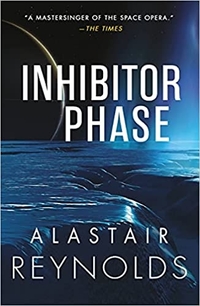Over My Dead Body by Jeffrey Archer
 Wednesday, October 20, 2021 at 8:51AM
Wednesday, October 20, 2021 at 8:51AM 
Published by HarperCollins on October 19, 2021
Over My Dead Body is the latest and best of four novels (with another to come) that chronicle the early career of William Warwick, a British cop who rises quickly through the bureaucracy of Scotland Yard as the series progresses.
Warwick is now a Detective Chief Inspector. He’s about to take charge of a unit that will examine cold case murders. Before that happens, he takes a cruise with his wife and rather handily solves an onboard murder with an assist from a precocious young American named James who attends a high-end prep school in Connecticut and plans to go to Harvard before becoming director of the FBI. William and James get along well, probably because they are both insufferably smug.
James is an American teen but he doesn’t sound like an American or a teen. His belief that American lawyers use the phrase “on the balance of judgement” rather than “beyond a reasonable doubt” suggests that James isn’t as smart as he believes himself to be. Or maybe he doesn’t watch American television.
In any event, the main story takes place after Warwick is recalled to England. Warwick’s nemesis throughout the series has been Miles Faulkner, whose crimes involve art and an ongoing attempt to swindle his wife Christina, who either is or isn’t the best friend of Warwick’s wife, depending on Christina’s shifting loyalties. Warwick is again hot on the heels of Faulkner, this time chasing him to Spain.
Jeffrey Archer overcomes the failings of the earlier novels in the latest installment. Warwick and his family have taken great pride in demonstrating the extraordinary refinement and proper behavior of British aristocracy. traits that make them annoying and dull. Fortunately, Warwick’s perfect father and sister play no role in this story, making Over My Dead Body less a novel of manners than the earlier books.
Warwick still has a stick up his bum, as is evidenced by the sole G-rated sex scene. Warwick’s idea of foreplay is to discuss his latest case with his wife while they’re getting undressed. But at least they’re getting undressed, which is an improvement from the earlier novels.
Archer brings a character named Ross to greater prominence in this novel. Ross acts as a counterbalance to “choirboy” Warwick. Having finished his undercover assignment, Ross becomes involved with a former hooker whose loyalty to Ross or to the forces of evil is not immediately clear. When Ross is given reason to seek revenge for an injustice, he does so untroubled by the law. This should give the moralizing Warwick fits, but he sublimates his law-and-order instincts to some degree, allowing a more interesting plot to develop than Archer achieved in the earlier novels.
RECOMMENDED



